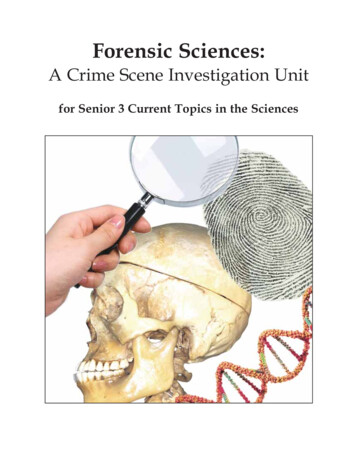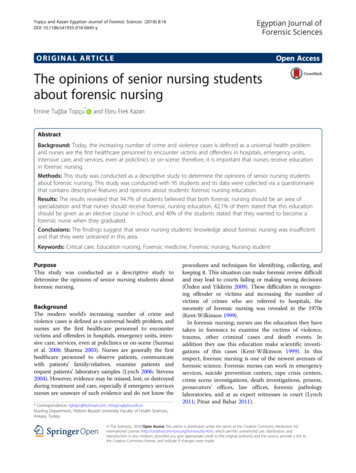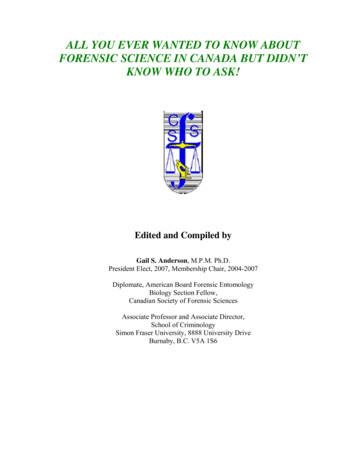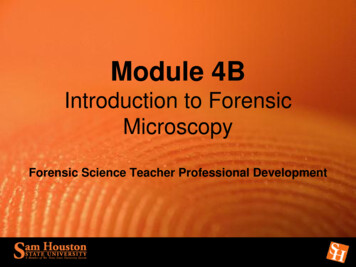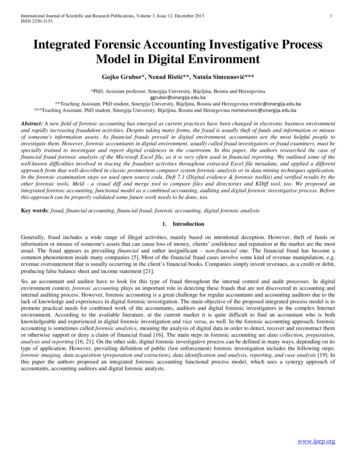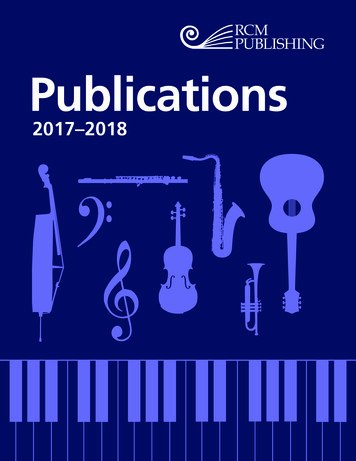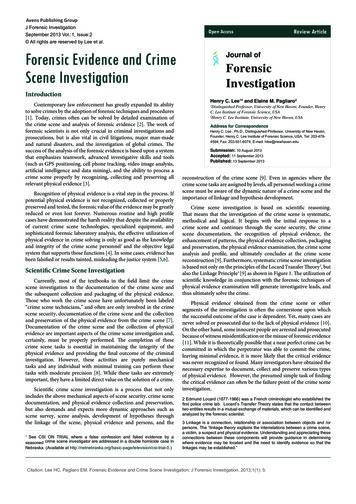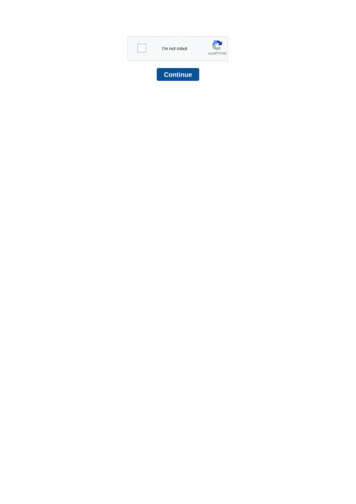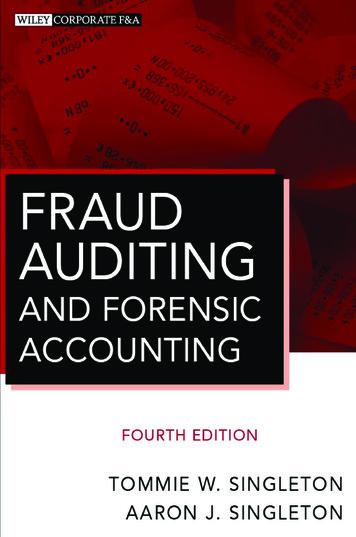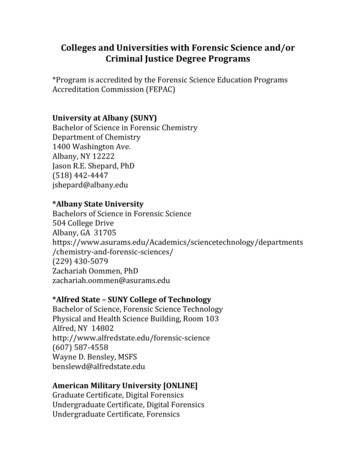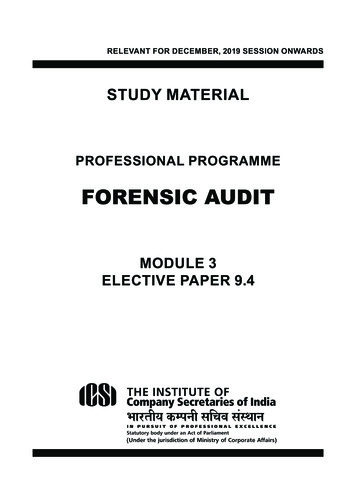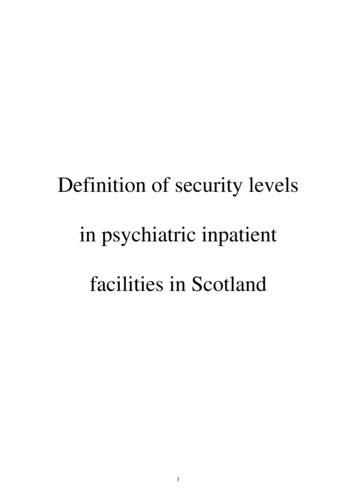
Transcription
SYLLABUS (v.1)Forensic and Investigative AccountingACCT 562 – 01W (80813)FALL 2013 (AUGUST 26 – DECEMBER 13, 2013Instructor:Location:Contact:Christopher Meadors, JD, CPA, CFFAssistant Professor, Department of AccountingONLINE CLASS (http://online.tamuc.org)Best: Email: prof meadors@empirecentral.com(Not tamuc.edu or eCollege email)Virtual Office: eCollegeCourse Description:This course covers important topics associated with modern forensic and investigativeaccounting. Topics include fraud auditing, litigation support, valuation, cybercrime, andother key forensic topics. The objectives include understanding the principles andpractices used by public accountants, internal auditors, and others used to examinefinancial and related information.Course Embedded Assessment Objectives:Your achievement level for each objective will be measured by your success incompleting assignments regarding the following key objectives: Describe types of financial fraud schemes and risks. Identify the rules of evidence and civil procedure as they relate to successful forensicand expert testimony. Apply methods available to determine commercial or economic damages.Textbooks and Materials:Required Textbook:Crumbley, D., Heitger, L., & Smith, G. (2009). Forensic and InvestigativeAccounting (5th ed.). Chicago: CCH. (ISBN: 9780808026877).Other required materials will be posted or linked online (at no cost).1 Pagev.1 (rev. 08.21.13)
Evaluation:In general, the following grading schedules will apply for this course:Grade ScaleABCDF10090%- 450500 pts40089 - 80%449 pts35079 - 70%359 pts30069 - 60%349 pts0 59%299 ptsAssignment Values(superior)Attendance (15 lectures)75(above average)Participation (11 Discussionsand at 2 Class Live)75(average)Quizzes (15 quizzes)150(below average)Creative Paper100(failing)Final Exam or Paper100Total Points 500AttendanceThe core delivery method for this course is a series of recorded lectures available ineCollege. Your attendance grade is based on your completion of the all required lecturesby the stated deadlines.There are 15 lectures over the semester, approximating 1 per week. These lectures aretied to assigned readings in the book and or other assigned materials (e.g. outsidereading, videos, articles). Each lecture is further broken into individual sub-lectures orsegments –of varying length. This is designed to allow you flexibility in terms of timing,scheduling, and understanding the material.You are free to view each lecture/segment according to your own schedule as you seefit. However, in order to receiver full credit for attendance, you must complete alllectures (all segments), as well as discussions and quizzes (discussed below), assignedfor that week no later than midnight on Sunday of that week. The specific dates areindicated on eCollege.ParticipationDiscussions. Your participation in class discussions is expected and is counted towardsyour final grade. Following most Lectures, there will be a required discussionquestion. There are 11 total required discussions. Students are to post at least oneresponse to the question or two responses to another student. Note: I reserve theright to lower a student’s grade based on an obvious lack of thought or considerationreflected in a student’s response to the discussion questions (e.g. “I agree” with noother comment is not a creditable response).2 Pagev.1 (rev. 08.21.13)
In addition to the required Discussion questions, there are threads for students topost questions about the material in that lecture. This section is purely optional(although encouraged) and will not negatively impact your grade.Class Live. I will be conducting a Class Live session each week during the period (exactdays times will be posted in eCollege). This session is not a lecture, but is instead anopportunity to engage with me live, ask questions, or discuss anything related to thematerial or the subject matter. We will also go over any chapter questions or otherproblems I believe to be helpful or relevant to the material. These sessions are alsorecorded and may be watched at any time.These Class Live sessions are not per se required, subject to the following caveat: ashaving no one attend renders these sessions moot – each student is required toattend at least two (2) of the sessions live (as in REAL TIME). The sessions will bescheduled at different times throughout the semester to allow students anopportunity to participate. Your attendance is counted as part of your participationgrade.Once again - in order to earn full credit for the Participation, you must participate in allDiscussions by their assigned dates, and participate in at least 2 Class Live sessions inreal time.QuizzesFollowing each lecture, you are to complete a short quiz covering the assigned material.That may include material discussed in the lecture, assigned reading/material (even ifnot discussed in the lecture). There are 15 quizzes total and each quiz has a maximumpossible value of 5 points. Quizzes may be composed of multiple choice, true/false, fillin the blank, matching or short answer. Each quiz may only be taken 1 time and must becompleted no later than midnight Sunday for the week in which it is assigned. QUIZZESARE NOT GROUP PROJECTS AND ARE TO BE COMPLETED BY EACH STUDENT WORKINGON THEIR OWN. I will not be dropping any quiz grades this semester due to thesuffering students have imposed upon me in the past related to this procedure.Creative PaperPrepare a one-hour action packed T.V. episode with the main character a forensicaccountant. The main character should be called Dane Striker or Sloane Striker. Yourproject should include at least a pitch, a list of characters, and overall plot for the T.V.show. We will discuss this project in more detail in class.Final Exam or Research Paper (your choice)This semester I am trying something new. Students will have a choice of either taking acomprehensive Final Examination or completing a well-researched and properlyformatted Research Paper for this class. Students much chose one or the other and I willnot offer both as an extra credit option.3 Pagev.1 (rev. 08.21.13)
Final Exam. Students must take a Comprehensive Final Examination during the last weekof class. This test will cover all assigned material and will be composed of MultipleChoice, True/False, Matching, Fill in the Blank, and Short Essay. It will be taken onlineand will be time-pressured. You will only have 1 opportunity to take the Exam, and itmust be completed in one sitting.Research Paper. As an alternative, students will propose a research topic (to beapproved by me) and complete a Research Paper. The exact details of this paper will bediscussed in class, but will certainly require students to research an issue related toforensic accounting, provide an analysis and a well-supported conclusion. The papermust be properly formatted, thorough and thoughtful. They must also be work of theindividual student.CommunicationBy far the best way to reach me is via email at the address listed above. Please note thatthis address is NOT my regular tamuc.edu email and it is NOT the email that isconnected to the e-mail took within the eCollege system (also my tamuc.edu address). Ido check my regular university email, but not with the same frequency as my primaryemail listed above. This email has been setup to allow your messages to be more easilydistinguished among the volumes of other email communications in a day.Another note about email, I receive hundreds of emails each week. I do my best torespond to your emails on a timely basis but some just get by me. If you don’t hearfrom me within 3 days, you should feel free to send me a reminder email (I won’t beoffended.)Ethics:Integrity is the hallmark of the accounting profession and will be stressed throughoutthe course. Any type of student breach of ethics, including but not limited to: illegalactivity, dishonest conduct, cheating, plagiarism, or collusion, will result in failure ofassignment or exam (F) and/or further academic sanction (i.e. failure of course (F),dismissal from class and/or referral to Dean of the College of Business and Technology).“All students enrolled at the University shall follow the tenets of common decency andacceptable behavior conducive to a positive learning environment.” (See Student’s GuideHandbook, Policies and Procedures, Conduct).By way of clarity, I am fully aware that in this information age, solutions, answers,research papers, and previously versions of class materials are easily available to you.However, this class is not intended as an exercise in locating and referencing otherpeoples’ work. I encourage you to exchange ideas or discuss problems in order toreach a conclusion, but you are expected to demonstrate an appropriate level ofmastery of the material on your own. If I find indications that you have failed to liveup to this standard, I reserve to adjust student grades (including to a failing grade),4 Pagev.1 (rev. 08.21.13)
deny credit for assignments, or refer to the matter to the Dean of Students for furtheraction according to University Policy.Students with Disabilities:The Americans with Disabilities Act (ADA) is a federal anti-discrimination statute thatprovides comprehensive civil rights protection for persons with disabilities. Amongother things, this legislation requires that all students with disabilities be guaranteed alearning environment that provides for reasonable accommodation of theirdisabilities. If you have a disability requiring an accommodation, please contact:Office of Student Disability Resources and ServicesTexas A&M University-CommerceGee Library, Room 132Phone (903) 886-5150 or (903) 886-5835Fax (903) uTechnical Problems/Questions:eCollege: Technical assistance is available 24 hours a day/ 7 days a week. If you havequestions related to eCollege, A&M-Commerce's online course management system,click on "TECHNICAL SUPPORT" on the left side of your course screen. An email box willappear. Fill out this technical support form, click submit, and your questions will beforwarded to the technical support staff. A resolution will be sent to you from thetechnical support staff via email. If at any time you experience technical problems (e.g.,you can't log in to the course, you can't see certain material, etc.) please contact theeCollege HelpDesk, available 24 hours a day, seven days a week. The HelpDesk can bereached by sending an email to helpdesk@online.tamuc.org or by calling 866-6565511. Additionally, you can click on the "Help" button located at the top of each pagefor more information.Newer versions of Explorer block pop-ups. You should disable the pop-up blocker to theonline learning sites to avoid this problem. To temporarily turn it off or disable it for aspecific web site, go to tools and then pop-up blocker and select the off or pop-upblocker settings. The off selection temporarily turns it off until the browser is closed andthe settings selection lets you permanently allow a specific web site to use pop-ups.Personal computer problems do not excuse the requirement to complete all coursework in a timely and satisfactory manner. Each student needs to have a backupmethod to deal with these inevitable problems. These methods might include theavailability of a backup PC at home or work, the temporary use of a computer at afriend's home, the local library, Office Services such as Kinko’s, an Internet cafe, or abookstore such as Barnes & Noble, etc.5 Pagev.1 (rev. 08.21.13)
Dropping or Withdrawals:University policy will be followed in regards to withdrawals during the semester. It is thestudent’s responsibility to conform with the university rules relating to dropping orwithdrawing from the course. I have no input or role in the drop process, so any suchissues or questions need to be addressed to the Registrar’s office.With respect to students attending school subject to another program (e.g.International Students or those attending through employer sponsored educationprograms), please be aware that the requirements of your own program is oftendifferent (usually more strict) than those of the University. I have had students dropclasses as permitted by the University only to find out that their own student visas orstudy programs were then at risk. Remedying such situations is at best challenging, andoften impossible. If you are attending under such a program, please contact youradvisor in advance of taking action to drop classes or not attending class.NOTE: This syllabus is subject to change as needed to meet the objectives oradministration of the course at the discretion of the Professor. It is not anticipated thatthere will be any substantive changes.Class Schedule:A detailed class schedule will be posted to eCollege.6 Pagev.1 (rev. 08.21.13)
RUBRIC FOR GRADINGATTENDANCEWeekly Lectures (75 points)Required: View 15 Full Lectures (all segments)Value: Up to 5 points each.Total Attendance (75 points)PARTICIPATIONDiscussion Questions (55 points)Required: Complete required Discussionquestions after certain Lectures the assigneddeadlines.Value: Up to 5 points eachClass Live Sessions (20 points)Required: Each student required toparticipate in at least 2 Class Live session atthe scheduled time (i.e. Live)Value: 10 points eachTotal Participation (75 points)QUIZZESQuizzes (150 points)Required: Complete Quiz questions after bythe assigned deadlines.Value: Up to 10 points each.Total Quizzes (150 points)CREATIVE PAPERCreative Paper (100 points)Required: Complete the Creative PaperValue: Up to 100 points.Total Creative Paper (100 points)FINAL EXAM or PAPEREXAM (100 points)Required: Comprehensive ExamValue: Up to 100 points total.1 PageExemplary68 - 75 pointsComplete no less than 14full lectures by the datesindicated.Good60 - 67 pointsComplete no less than 12full lectures by the datesindicated.Satisfactory/Needs Improvement45 - 59 pointsComplete no less than 9full lectures by the datesindicated.Unacceptable0 – 44 pointsCompleted less than 9full lectures by the datesindicated.50 - 55 pointsTakes part at least 10required discussions bythe dates indicated.44 - 49 pointsTakes part at least 9required discussions bythe dates indicated.33 - 43 pointsTakes part at least 7required discussions bythe dates indicated.0 – 32 pointsTakes part in less than 7required discussions bythe dates indicated.20 pointsAttended at least twoClass Live session duringthe Semester at the timeindicated.10 pointsAttended at least oneClass Live session duringthe Semester at the timeindicated.135 – 150 pointsCorrectly answers onaverage of at least 90%on quizzes120 – 134 pointsCorrectly answers onaverage between 80%and 89% on Quizzes90 – 119 pointsCorrectly answers onaverage between 60%and 79% on quizzes0 – 89 pointsCorrectly answers onaverage of less than 60%on quizzes.100 - 90 pointsStudent demonstratesunderstanding of FraudRisks, Risk Factors,Scenarios, andResponses.80 - 89 pointsStudent demonstratessome understanding ofFraud Risks, Risk Factors,Scenarios, andResponses.60 – 79 pointsStudent demonstratessome understanding ofFraud Risks, Risk Factors,Scenarios, or Responses.0 – 59 pointsStudent does notdemonstrateunderstanding of FraudRisks, Risk Factors,Scenarios, or Responses.100 - 90 pointsCorrectly answers atleast 90% of the examquestions correctly.80 - 89 pointsCorrectly answersbetween 80% and 89% ofthe exam questionscorrectly.60 – 79 pointsCorrectly answers atleast 60% - 79% of theexam questionscorrectly.0 – 59 pointsCorrectly answers lessthan 60% of the examquestions correctly.n/av.1 (rev. 08.21.13)0 pointsAttended no Class Livesessions at the timeindicated during thesemester.
PAPER (100 points)Required: Research PaperValue: Up to 100 points total.100 - 90 pointsPaper is thoroughlyresearched, properlyformatted, and graduatestudent quality.80 - 89 pointsPaper is mostly wellresearched, formatted,and graduate studentquality.60 – 79 pointsPaper is somewhat wellresearched, formatted,and graduate studentquality.0 – 59 pointsPaper is inadequatelyresearched, not properlyformatted, and/or lessthan graduate studentquality.Total Final/Paper (100 points)CLASS TOTAL (500 points)NOTES TO GRADING RUBRICYOUR ATTENDANCE GRADE MAY ALSO AFFECTED BY: Completion of less than all segments within a Lecture will result in partial credit, between 0 – 10 points, depending on how muchwas completed. Indications that students did not really view required Lectures, even where eCollege may indicate it was completed, may resultin a lowering of the score awarded (including to zero). Indications that the videos were viewed by someone other than the registered student may negatively impact that studentsgrade.YOUR PARTICIPATION GRADE MAY ALSO AFFECTED BY: Responses to required discussion questions that are too brief, lack thought or consideration, or otherwise demonstrate a failuremeet the spirit of the discussion requirement will result in a negative grade adjustment (including to zero). While there are no “bonus points” or extra credit for particularly insightful or robust discussions by students, it will be a factorconsidered in whether to adjust students at or near a grade cut-off to the next level.YOUR QUIZ AND FINAL EXAM GRADES MAY BE AFFECTED BY: Indications of plagiarism, group work, or cheating. Indications that the quizzes and/or exams were completed by someone other than the registered student.2 Pagev.1 (rev. 08.21.13)
COURSE RUBRICCriteria (Course Objectives)Describe types of financial fraudschemes and risks.2 (Emerging)Student can describesome fraud risks andschemes.3 (Proficient)Student can describemany fraud risks andschemes4 (Exemplary)Student can describemost fraud risks andschemes.Identify the rules of evidence and civil Student is unable toprocedure as they relate to successful identify these rules.forensic and expert testimony.Student is able to identifysome of the rules.Student is able to identifymost of the rules.Student is able to identifyall the rules.Apply methods available to determine Student is unable tocommercial or economic damages.apply these methods.Student is sometimesable to apply thesemethods.Student is frequentlyable to apply thesemethods.Student is consistentlyable to apply thesemethods.3 Page1 (Unsatisfactory)Student is unable todescribe fraud risks andschemes.v.1 (rev. 08.21.13)
Identify the rules of evidence and civil procedure as they relate to successful forensic and expert testimony. Apply methods available to determine commercial or economic damages. Textbooks and Materials: Required Textbook: Crumbley, D., Heitger, L., & Smith, G. (2009). Forensic and I
